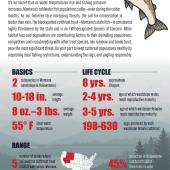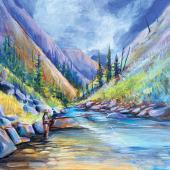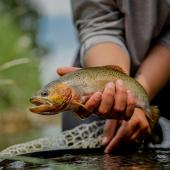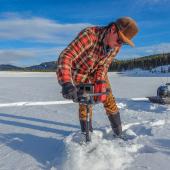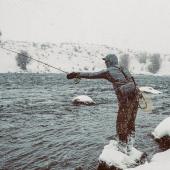School of Thought
Trout groupthink or atmospheric pressure?
Over drinks, salad, baked potatoes, and big steaks, we tallied up. Fishermen do this. Who caught the first fish? The biggest? The most? The tallying-up is really no big deal. Nothing wrong with a little friendly competition—especially at the end of a good day fishing in southwest Montana.
It was a beautiful fall day on the Yellowstone. The cottonwoods along the river’s edge were ablaze in orange and yellow. The sun peeked around passing clouds all day, but the rain held off. We did well, making a respectable haul of decent-sized fish, along with a couple of beauties. So, we decided to go back to the same spot the next day. We had to suit up in rain gear, but everything else remained the same—same river, same run, same two fishermen, same rods, same flies, same boat, same guide. We were ready. We knew, we just knew, that we were gonna knock ’em dead.
We damn near got skunked.
Wait a minute. What? How could we do so well one day, but the next we couldn’t buy a good fish? Everything was the same. Well, almost—there were more clouds and some rain. There was more wind and it blew leaves into the river. Oh sure, we coaxed a couple little guys and a few whitefish. But that was it.
We knew what we were doing. In fact, Vince, our guide, refers to us as “pretty good sticks.” At lunch, we sat in fold-out chairs on a sandbar along the edge of the river, scratching our heads.
Now, I can understand why a few trout in a particular stretch of water won’t show themselves. Maybe some pelicans or mergansers just drifted by. Maybe an otter or a mink is lurking around looking for lunch.
Or, it’s human error. Maybe we presented our flies in an unnatural manner. We had to fight the wind, so our casting and mending were a bit of a struggle.
Maybe some trout just weren’t hungry. But others should be. After all, they’re predators. We offered them prey. So why were all the trout in the river acting the same way? Was there some kind of school mentality going on? Was there some kind of Yellowstone River trout groupthink happening? All the fish along this 12-mile stretch, it seemed to us, had the same thing in mind: avoiding our flies.
We discussed this at length. You can imagine the ideas that came out of a couple of fishermen who did so well the day before but were doing so malo today: some scientific, some philosophical, some just plain stupid.
We, as humans, may or may not feel the effects of barometric pressure. But does it have an effect on trout?
“They’re down there laughin’ at us. That’s what they’re doing.”
“It’s Sunday. Maybe trout only eat worms on Sunday.”
“Ya think they know we’re hung over?”
“Maybe they know it’s us and they’re scared ’cause of what we did to ’em yesterday.”
“Yeah, that’s it; ‘Hey Charlie, don’t eat that thing, I ate one of those yesterday and it dragged me all over the river.’”
There were more theories proffered, but you get the picture. Eventually we settled on trout groupthink, the most likely—and least silly—scenario. But then Vince said something that hit me. Bam! It hit me the way the trout were hitting our flies yesterday.
“Maybe it’s barometric pressure.” Hmm. I thought about it a moment. What is barometric pressure? Without getting into a detailed scientific discourse, barometric pressure, otherwise known as atmospheric pressure, is the weight of the atmosphere. It’s the pressure on the earth from the weight of the air. We’ve all heard the weather-person talking about high-pressure systems and low-pressure systems. We, as humans, may or may not feel the effects of this type of pressure. But does it have an effect on trout?
Think about what air pressure does to your ears in an airplane. People say that barometric pressure causes headaches. Now think about that fish. Consider his little brain. Consider his little swim bladder. Bony fish, such as trout, have two small, gas-filled bladders, like tiny balloons, inside their bodies. They use these to control their buoyancy and stabilize their depth in the water, like a scuba diver uses a buoyancy-compensation vest. Think about the trout’s rapidly beating heart. Think about his hectic life, darting in and around rocks and behind logs, through swift, moving water. Think about the effects of barometric pressure on those little organs and that fast-paced life.
I’m not a scientist. I’m a fisherman, and all fishermen want to know how to catch fish. Anglers have been trying to out-think fish for a long time. And after thinking about it for some time, I still don’t know if barometric pressure played a role on our near-fishless day. I don’t know if barometric pressure even has an effect underwater. But I do know this: I’m going right back to that same stretch of river. I’m gonna tie on a big brown Yuk Bug with those yellow rubber-band legs. I’m going to cast it to those foam pockets and beneath overhanging brush and try to lure those Yellowstone rainbows into attacking and eating my fly. And if the fish aren’t biting, I’ll sit back in the boat and ponder the reason, while enjoying the pageant of colors along the shoreline, as if it were a painting by Monet.





































